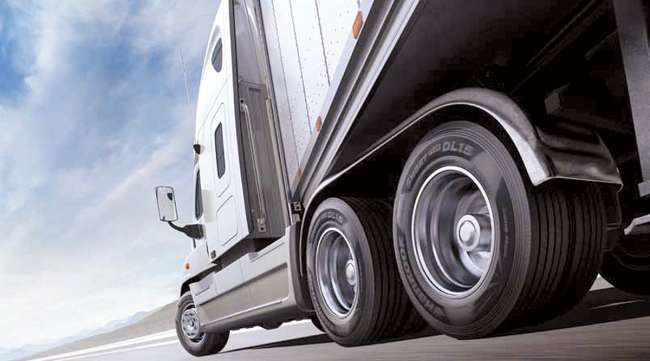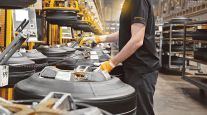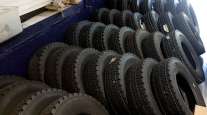Senior Reporter
Hankook Tire Looks to AI to Improve Production

[Stay on top of transportation news: Get TTNews in your inbox.]
Hankook Tire, whose commercial products are on U.S. fleets, announced the predictive model it is developing using artificial intelligence could slash in half the time it takes to develop tire compounds.
The Seoul, South Korea-based tire maker reported its Virtual Compound Design system uses technology to predict the characteristics of compounds and “draws the optimal combination of materials through artificial intelligence analysis, which is based on accumulated data without actual testing during the tire compound development.”

Generally, it takes six months to three years to develop a new compound, but this period is expected to be reduced by 50% if artificial intelligence is used, according to Hankook.
Tire compounds are a mixture of more than 15 types of materials such as natural rubber, synthetic rubber and carbon black, giving each compound different properties depending on, among others, temperature, order of combination and pressure, as well as the ratio of combinations of each material, Hankook noted.
Hankook’s efforts with AI started as an internal research project and accelerated through collaboration with South Korea’s top research institute, Korea Advanced Institute of Science and Technology. “Since then, the accuracy of data analysis has been greatly improved, currently showing an increased reliability of more than 95%,” a company statement said.
One industry observer noted Hankook’s reputation for being technically proficient and providing quality products for U.S. truck fleets, but he underscored the importance of testing at every phase — the needed raw materials, semi-finished product and finished tire that must meet U.S. Department of Transportation specifications.
“Artificial intelligence, bottom line, does not replace actual testing. It’s just that simple. It’s a great way to crunch the numbers,” Norm Ball, a tire industry consultant, told Transport Topics. “How does artificial intelligence know how recycled carbon black is different from virgin carbon black and by what percent?”

Hankook Technodome, the tire manufacturer's high-tech research center in Daeduk Innopolis, Daejeon, Korea. (Hankook Tire)
Ball added: “That data doesn’t stay stable. It changes because of all the variables of the myriad different products that are incorporated into the making of a tire. You can have a truckload come in with 20 pallets of rubber on it, and they are not all going to be the same. Those supply lines are not as consistent as we would like them to be.”
“At Hankook, we put safety first. So while AI helps accelerate the compound development process, we also conduct physical tests ourselves to make sure that the results match,” a company spokesman told TT. “As we expand the use of our Virtual Compound Design system and plan to complete the ‘Digital Twin’ system by 2026, we anticipate that we will be able to minimize real-world, rolling-resistance testing and accelerating development time without compromising the safety of our products.”
Hankook said it is planning to expand the technology to the entire process of developing tires — from material selection, design, tire test and mass production.
The new development system operates within the cloud platform by creating a digital twin derived from virtual simulations, and then converted into reality, both results affecting each other to bring improvements. Tens of thousands of units of its related data have been analyzed through cloud-computing platforms such as Amazon Web Services and Google’s TensorFlow, an artificial intelligence engine, and evolve through machine learning.
In related news, Hankook announced its most popular truck and bus radial products now are available at Love’s Travel Stops & Country Stores, including at their Speedco and on-site Love’s Truck Tire Care locations across the country.
Love’s has more than 350 truck service centers, which include on-site and stand-alone Speedco and Love’s Truck Tire Care locations, and Hankook tires are now available at all locations.

Designed to reduce fuel and increase total mileage, the e3 Max AL21, e3 Max DL21, and e3 Max TL21 TBR tires offer the full breadth of fleet services — steer, drive and trailer tires. Each of these tires focuses on the main performance factors of safety, mileage, anti-chip and cut, retreadability and traction.
“We are thrilled to be part of Love’s strong network to further help professional truck drivers stay safe on the road,” Rob Williams, Hankook senior director for TBR sales, said in a release. “These three TBR tires cover fleets’ needs, axle-to-axle, all of which are SmartWay approved.”
SmartWay is the U.S. Environmental Protection Agency’s voluntary program aimed at increasing efficiency and fuel economy.
Want more news? Listen to today's daily briefing:




